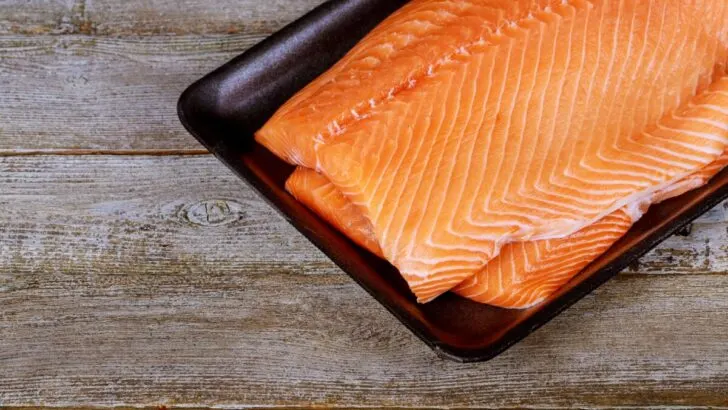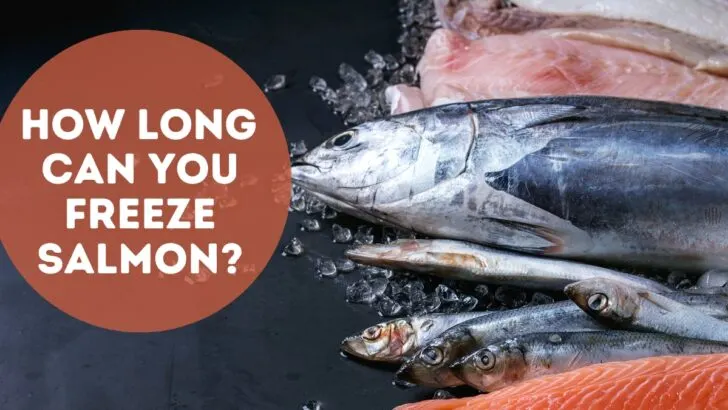Salmon is nutrient-dense seafood abundant in minerals, omega-3 fatty acids, and proteins. Eating salmon that has never been frozen is always the best for your health. However, if you don’t live near vendors or don’t want to visit them routinely, by storing and freezing salmon, you can continue to consume it whenever you want.
Salmon can be frozen for six to nine months at most. After a year, the quality will start to deteriorate.
It’s best to properly freeze it by keeping your freezer at 0 degrees Fahrenheit and to also store your salmon in a vacuum-sealed bag once it has been cleaned and dried for the best results.
That being said, there is still a lot of information that one must keep in mind, so without further ado, let us dive straight into them.
How Long Can Different Types of Salmon Be Kept Frozen?
Depending on the kind of salmon bought, there are different time limits on how long a salmon can be frozen.
Smoked Salmon
An opened package of smoked salmon can be safely stored in a freezer for approximately one month after it has been opened. To extend their shelf life, wrap smoked salmon packages that have been opened firmly in heavy-duty aluminum or plastic wrap.
Canned Salmon
Canned salmon can be kept in the refrigerator for up to 3–4 days. The shelf life of canned salmon is also further increased by freezing it. In the freezer, canned salmon that has been constantly frozen is safe to eat until three months.
Raw Salmon
Raw salmon can retain its optimum flavour after being frozen for about three months. Rinse, dry, and wrap fresh salmon in an airtight container before freezing.

Although you can freeze it for almost six months, after three months the salmon quality may begin to deteriorate. As a result, it is recommended to use it within six months of the frozen date and mark it with that date.
Can I Refreeze Salmon That Has Been Frozen Before?
You can safely refreeze salmon that has been previously frozen once it has been thawed. And to keep the salmon’s flavour, texture, and quality, you’ll need to remove as much moisture from it as you can. Put your salmon in a vacuum-sealed bag or another container to keep it frozen.
Is It Safe to Put Cooked Salmon in the Freezer?
The only condition to putting cooked salmon in the freezer is that the cooked salmon hasn’t been left out of the refrigerator after cooking for more than an hour. If you don’t believe you’ll consume the cooked salmon within three to four days then it’s safe to store in your refrigerator or freezer.
How Should Salmon Be Frozen?
Following are the measures you must take if you intend to freeze salmon:
1. To fit into your freezer bags or containers, if you have a whole salmon, chop it into smaller pieces.
2. Use cold water to wash and paper towel dry the salmon fillets.
3. Pack the salmon fillets as tightly as you can into freezer bags or other freezer-safe containers.
4. Mark the fish with the date it is being frozen, then store it in your freezer.
Thawing Frozen Salmon
Cooking salmon that is still frozen may cause it to lose some of its taste and texture. Therefore, it is better to give yourself enough time to completely thaw the fish so that its flavor and nutrients aren’t lost. Below are a few ways one can employ to soften and thaw your frozen salmon.
1. Using a Refrigerator
Allow your salmon to gradually thaw in a refrigerator for at least 12 hours. Start by planning for your dinner beforehand and transferring the salmon from the freezer to the refrigerator. You should take the salmon out of the freezer 24 hours before cooking if it weighs more than one pound. Remove it from the packing and then wrap it in plastic wrap large enough to contain the entirety.
2. Using Cold Water
Salmon can be defrosted in cold tap water if you’re in a rush or just have an hour to prepare your meal. First, remove the salmon from its packing and repackage it in a dry zip-lock bag. So that the fish defrosts evenly, put the bag in a big basin.
Next, move the bowl to the sink and fill it with ice-cold water. Fish should not be thawed in hot water, as this might lead to bacterial development. Until the fish is completely defrosted, add fresh water to the bowl every 10 to 15 minutes.
3. Using a Microwave
Defrosting salmon in a microwave is the quickest way to do it. However, this approach is not advised, as there is a higher danger of bacterial development and microwave heating might cause the salmon to defrost unevenly.
For this method, remove the salmon from its box and defrost it in the microwave. After that, put it in the microwave on a paper towel. Place the fish so that the centre of the container is filled with its narrowest sections. With yet another paper towel, wrap the fish.
Set a five-minute timer for each pound of fish. The salmon should be turned over after two and a half minutes in the microwave. Continue defrosting for a minute and then the salmon is ready to be cooked.
How to Determine Bad Salmon
When storing, preparing, cooking, or reheating salmon, there are a few things to look out for to be sure it has stayed good. Raw Salmon shouldn’t smell fishy, feel too slimy, or have any colour changes in the meat. Additionally, the salmon should be thrown out if the meat feels mushy to the touch rather than firm.
As a general guideline, if you’re working with cooked salmon, throw cooked salmon that has been in the refrigerator for more than three or four days in the garbage rather than taking a risk.
Final Words on How Long Salmon Can Be Frozen
In conclusion, salmon can be stored for long periods in a freezer, however, after six months you can expect the quality to worsen. When decided to keep your salmon in a freezer make sure to properly keep it in an air-tight freezer bag and label the date so that you may be reminded of how long the salmon has stayed in the freezer.
Additionally, it is important to properly thaw the salmon before planning to cook either using a refrigerator, cold water or microwave so that it may not lose its freshness or taste.


